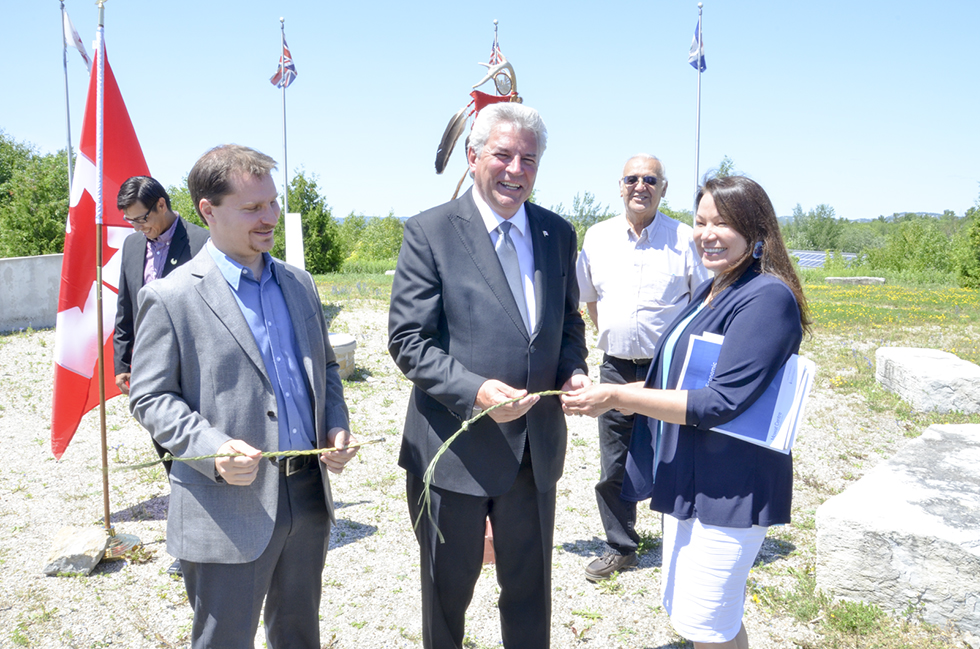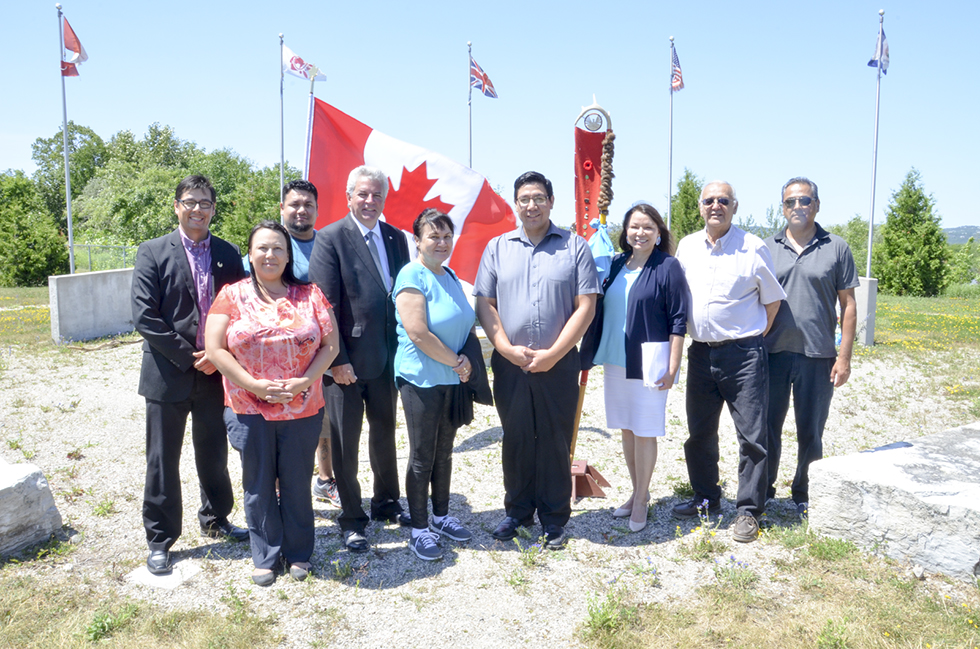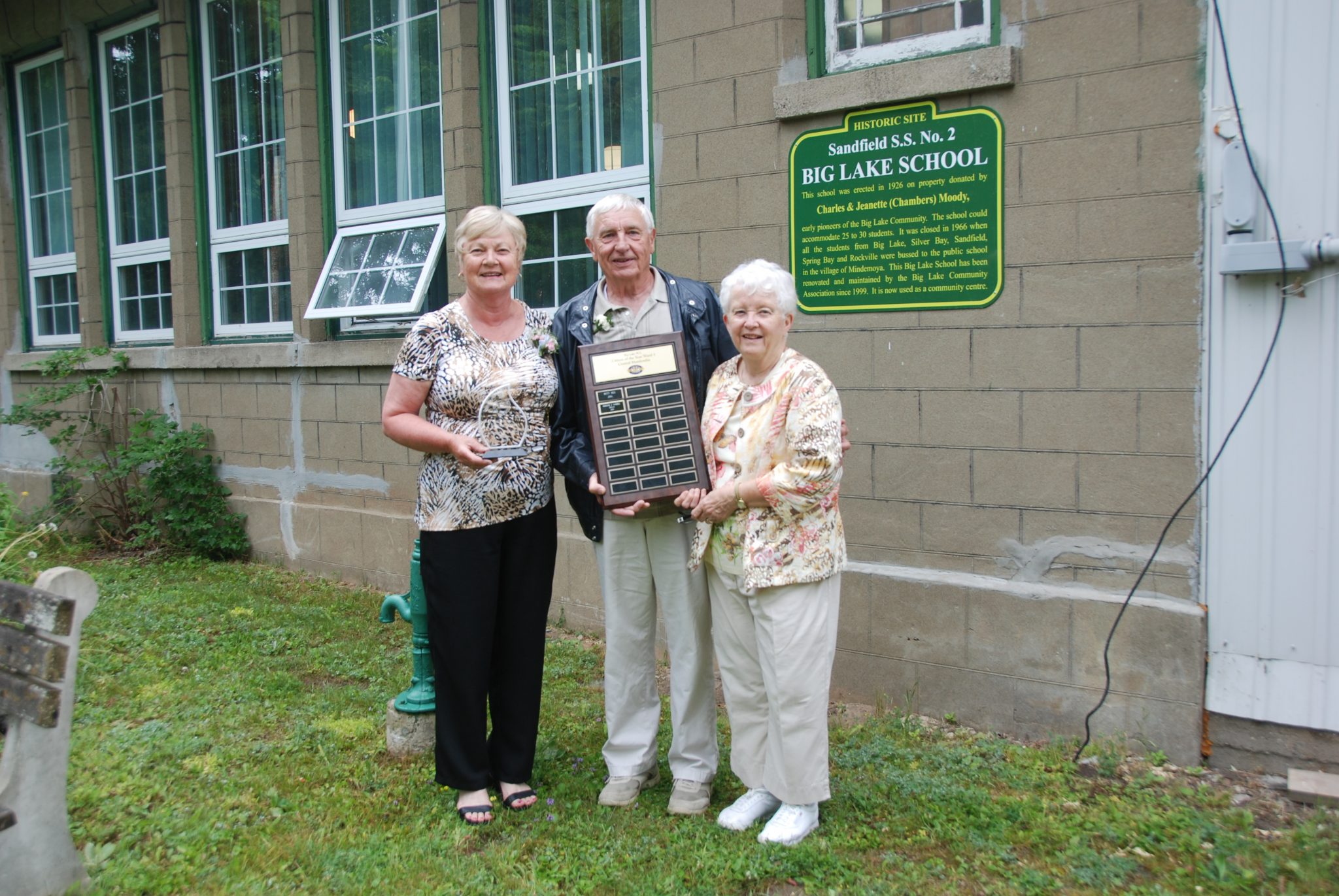BIRCH ISLAND—The summer funding announcement season is full upon us, and Sault Ste. Marie MP Bryan Hayes arrived bearing a swath of good news for local organizations in the form of FedNor grants.
Mr. Hayes, who was representing the Honourable Greg Rickford, Minister of Natural Resources and the minister in charge of FedNor (Federal Economic Development Initiative for Northern Ontario), made the Island announcements during stops in Gore Bay and at the Waubetek Business Development Corporation offices in Birch Island.
“Our government is proud to support strategic initiatives that stimulate business development and growth in Northern Ontario, while strengthening the economy and creating jobs,” said Mr. Hayes. “The funding announced today will deliver immediate and long-term economic results for the region by providing businesses and communities with access to the resources they need to thrive in the modern economy.”
“Today’s announcement demonstrates the confidence that the Government of Canada has in Community Futures organizations to strengthen and grow the regional economy,” said Waubetek Chair Martin Bayer. “These investments will enable us to respond to the needs of local businesses and communities, enhance tourism and help create jobs right here in the Manitoulin and LaCloche areas.”
“Waubetek is honoured to be one of the only a couple of Community Futures Development Corporations in Northern Ontario to receive a five-year funding agreement,” noted Waubetek General Manager Dawn Madahbee Leach. “We also gratefully appreciate the support given to us from FedNor for regional economic initiatives and the Aboriginal Mining Strategy for Northeastern Ontario. FedNor has been a great partner with us over many, many years.”
Ms. Madahbee Leach noted that Waubetek has invested nearly $66 million in aboriginal businesses to date with a 94 percent success rate. “These businesses benefit regional economies and create much needed jobs for both aboriginal and non-aboriginal people alike. Where First Nation economies thrive, so do local regions as growing incomes and revenues are spent in the surrounding areas. The overall Canadian economy benefits when aboriginal people do well economically.”

Ms. Madahbee Leach added that Waubetek contributes “at a higher level” by providing advice and information on broad initiatives promoting new types of development. Among recent initiatives were remodeling aboriginal education to be “locally controlled and rooted in aboriginal culture. Along with this, we support the National Aboriginal Economic Development Board’s recommendation to establish a task force of aboriginal experts and academics appointed by aboriginal organizations to redesign education programming.”
Waubetek has also assisted in “Developing discrete strategies for closing the gaps for First Nations on reserve as a government-wide priority,” she said. “The federal economic agenda needs to concentrate on First Nation treaty rights, obligations and working relationships. There also needs to be a concentrated effort on building knowledge and education of First Nation culture and the history of First Nation lands. A revised relationship needs to be considered with respect to resource revenue sharing and federal transfers that will allow First Nation communities and people to take advantage of, and participate in, economic and business opportunities.”
Ms. Madahbee Leach concluded her remarks with a quote from Chief Clarence Louie of Osoyoos in British Columbia. “If you want to kill a man, take away his job. If you want to kill a community, take away its economy.”
“So building communities through business development is what all of us are here do and the stability facilitated by this agreement will encourage development, promote sustainability and, in the end, strengthen all of Ontario,” she said.
Among the announcements at Birch Island were $1,732,200 for Waubetek that will “encourage business development and growth and job creation in the organization’s service are, which includes 28 First Nations communities in Northeastern Ontario.”
The FedNor funding ($1.5 million) will enable Waubetek to continue its role providing small and medium enterprises with access to capital and business counselling over the next five years. This funding has enabled Waubetek to invest over $58 million in more than 2,000 aboriginal businesses.
The second segment of the funding, $232,200, will support regional and economic development activities across Northeastern Ontario, including implementing an aboriginal fisheries strategy and an aboriginal mining strategy, deliver business management and youth entrepreneurship workshops as well as providing support to the Ontario First Nation Economic Developers’ Association.
Whitefish River First Nation received a $163,000 FedNor investment to support two projects. There is $100,790 for the completion of engineering designs and required studies to establish a new industrial park located on the reserve and $63,000 to enable Whitefish River First Nation to hire a youth intern for a two-year period. The intern will support the implementation of the community’s economic development and strategic plan priorities such as expanding the local farmers/artisan market, implementing a youth employment strategy, establishing an industrial park and pursuing revenue generating solar energy projects for First Nations.
Also on the green energy front, the Manitoulin Wind and Solar Institute will receive $43,000 to complete a feasibility study to determine the viability of assembling and selling solar-powered generators and small wind turbines—with the goal of establishing a new local business on the M’Chigeeng First Nation that will create new jobs and support long term viability of the community.
On the arts front, the Ojibwe Cultural Foundation received $49,500 to “develop cultural tourism exhibits and interpretive programs that focus on a new collection of 1,200 Ojibwe and settler artifacts highlighting 400 years of Georgian Bay cultural history that were donated recently to the organization. Weengushk Film Institute will receive $40,500 to support the organization’s marketing initiatives and to hire a youth intern, for one year, to assist in developing a marketing study and promotional materials as well enhancing Weengushk’s social media and online presence. Debajehmujig Storytellers will be receiving $31,500 to enable the hiring of a one-year youth intern who will work as a video production lead responsible for promotional and training videos that will help Debaj access new markets and increase revenue.
In Gore Bay, Mr. Hayes announced $1,486,303 for NetCentral to undertake a mobile wireless broadband deployment strategy (see detailed story in this week’s Expositor); the Town of Gore Bay received $489,915 to construct a 150-metre stone breakwater at the municipal marina; LAMBAC will receive $106,500 to deliver a tourism product development program supporting local businesses over three years; the Northern Ontario Aquaculture Association will receive $44,785 to complete research and planning to capitalize on export opportunities in international markets; the Township of Billings will receive $43,900 to enhance tourism through a waterfront master plan that will include architectural designs for a new harbour building and two marinas, as well as identifying viable commercial opportunities for those facilities; and the Manitoulin Island Community Abattoir will receive $28,845 to enhance its productivity and expand into new markets through the purchase and installation of specialized equipment to reduce downtime, boost productivity and expand processing services.
“Tourism and waterfront development are proven economic drivers for Northern Ontario communities and I would like to thank the Government of Canada for recognizing the needs of our community to strengthen the local economy,” said Gore Bay Mayor Ron Lane. “The funding announced today will further position the Town of Gore Bay and surrounding areas as a tourism destination of choice for visitors and guests to the Manitoulin area.”




